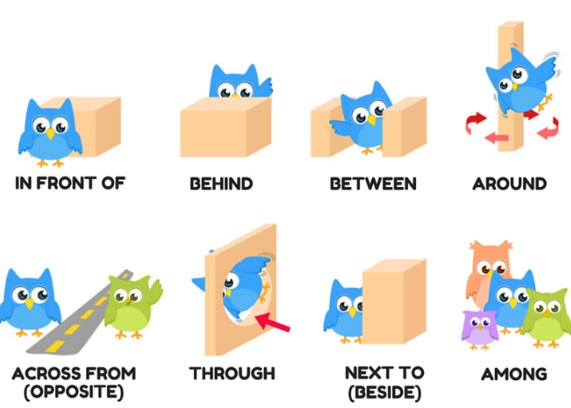2- Contents
Definition of prepositions
Prepositions, as in a large number of languages, are sometimes small words that fulfill the function of joining sentences, giving them meaning by connecting verbs with nouns, etc. They are used in all daily conversations and are an essential part of English, there are many prepositions, some of the best known are "With, at, by, to, in, for, from, of, on" being thus clearer the fact that they are very used and useful when communicating
Applications of prepositions
These words connect a noun or substitute noun with another, in other cases they serve us to join verbs with nouns and specify a location, that is, they help us to locate or point out actions, these are known as prepositions of place, and are normally placed behind the main verb, helping us to describe where an action happens or where something is found, in a specific case we have 3 in particular that serve to indicate a time such as "at, in, on" and are used for example to indicate the time or something that happened in a certain period of time like "the ball jumped at the same time as the boy". Examples of some prepositions:
Prepositions of place
Above = the plate is above the table
Across= Juan walked across the bridge
At= Carlos is at the work
Behind= Jhony esta detrás de ti
Below= the swimers swim below water
Beside= Luis sat beside me
Between= the distance between Brasil is huge
In= the cat is in the house
In front of= the girl is in front of the blue car
Near= the bus is near
Next to= the kitchen is next to the leaving room
On= the food is on the table
Opposite= the supermarket is opposite the cinema
Under= the ball is under the car
Normal prepositions
From= i am from Venezuela
At= she is at work
With= i am with my family
By= he came by train
To= i am going to buy arepas
Characteristics of prepositions
The main characteristics of prepositions are 3 and they are considered key except for one extra rule:
* They are considered a closed class of words, that is to say that their number cannot be expanded or at least it has not been done for many years, so it is considered something very rare and useless to add any new ones, because they cover all the content literary required, as far as expression is concerned.
* They are invariable words, without gender or number designations, which means that they are inclusive words since they include both genders in their expression, what could be considered with or a neutral word, leaving that designation to other words, adjectives, etc. and it does not have the function of a quantitative adjective since it does not describe any quantity or number.
* They do not have independence in the sentence, this means that they cannot appear in a sentence with a certainly deep context by themselves because their description is very basic and their true function is found in connecting words, because that is where their true sense.
* Some of these have more than one meaning or use, that is, we can use them as prepositions of time, place, movement, etc. at the same time and their meaning is denoted by the context of the sentence, this can get confusing because their translation is not limited to one word, example "in, on, at" are some prepositions with more than one meaning.
* Extra: they are not at the end of a sentence, it is an unwritten rule that has its exceptions which are few but there are, for example "That is something i Will not put up with" how they see it ends in with a preposition
Types of prepositions
There are 4 types of prepositions which serve to simply describe things such as time, place, movement or directions and another category which includes the rest of the prepositions is called basic prepositions.
Time prepositions
These are used to denote the moment in which something happens, in a contextual way, thus allowing us to form sentences such as "after they party" in which "after" would be our preposition, and is It denotes that whatever they were talking about will happen after the party. Example:
After=después : después de la fiesta- after party
Ago= long time ago
Arround= arround 3 o'clock
At= at the weekend
Before = before lunch
Between = between january and february
For= for 9 o'clock
During = during 9 months
From = from 7 o'clock
On = on sunday morning
Since = since the competition
To = a quarter to ten
Prepositions of place
Very similar to how time works, these indicate where things are in a simple way and it is used a lot in comparison, that is, when with respect to another thing or object. Example:
Above = above the mirror
Against= against the wall
At = Your shirt si at the closet
Below = below the sea
Beneath= they mounster is beneath the bed
Beside = the bedroom is beside the bathroom
In = the lamp is in the ceiling
Next to= his picture is next to the desk
On= My mother is on the kitchen
Under= David is under the table
Prepositions of movement or direction
These prepositions just as their name implies, they determine a direction or movement which is carried out in comparison to another object or place. Example:
Across = he walked across the bridge
Into = into the leaving
Onto = jump onto the Ledge
Over = over the raimbow
Through = go throught the tunnel
To = go to bathroom
Basic prepositions
They are the rest of prepositions that have a different context from the others and very unique. Example:
About= talking about football
As= he looks as me
By= the clothes by Zara are beautiful
From= the arepa is from Venezuela
In accordance with= act in accordance with the rules
Of = the phone of my father
On= travel on bus
Function of prepositions
As we have seen throughout the development, prepositions have many characteristics and uses that give them a truly important function when it comes to expressing ourselves in English, although at first glance we see them as short and simple words that by themselves do not mean Nothing when joined with other words can form really important contexts and situations to be such a short word, and in turn it gives meaning to the whole sentence because we could not imagine what it would be like to communicate if we did not have prepositions, have different meanings and we can use them in many ways as a preposition or conjunction, example "after or until", as an adverb in the case of "inside outside", also to form phrasal verbs, verbs formed by a verb and an adverb or preposition such as "hold in" which means "wait" in addition to what we already know as the prepositions of time, movement, direction and place.
All of this allows us to syntactically link phrases, words and sentences with a specific context, making sense of the words in a semantic way that, although it is something that English speakers for whom English is not their mother tongue, may find it a bit difficult to master. to be something very fun and useful to learn.



Comentarios
Publicar un comentario